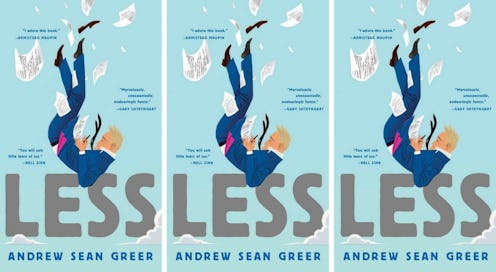Books
The New Pulitzer Prize Winning Novel Is Just What We Need Right Now — For An Unexpected Reason

To the surprise of many book-lovers, Andrew Sean Greer's Less was announced as the 2018 Pulitzer Prize Winner for Fiction on Monday afternoon. A hilarious and satirical story about a failed novelist trying to escape his problems by traveling abroad, Less may seem like an unexpected choice, but it's lightheartedness and the escapism it offers readers is actually what makes it the book many people — including me! — need right now.
In the weeks leading up to the Pulitzer Prize announcement, the book community was abuzz with excitement about which titles would take home the coveted awards. Among the top contenders in the fiction category were National Book Award winning novel Sing Unburied Sing by Jesmyn Ward and Man Booker Award winning novel Lincoln in the Bardo by George Saunders, two haunting novels that offer readers a heavy dose of heartache, grief, and sorrow. In the end, though, it was Andrew Sean Greer's Less that was awarded the most prestigious literary prize in the world, and needless to say, many readers were surprised. It's not that Less isn't a great book — Booklist called it "a wondrous achievement" in a starred review, the New York Times named it one of their Notable Book of 2017, and it was longlisted for the Andrew Carnegie Medal for Excellence, the Lambda Award, and the California Book Award — but the novel's humor and lightheartedness made it something of a dark horse.
Less follows Arthur Less, a floundering author on the brink of turning 50 who receives a wedding invitation from his ex-boyfriend of nine years. Instead of facing his heartache and confronting his feelings — or, for that matter, himself — Arthur packs a bag and heads to some interesting literary events all over the world. In Paris, he almost falls in love; in Berlin, her nearly falls to his death; in Southern India, he accidentally finds himself the only writer-in-residence at a Christian Retreat Center; and on a desert island in the Arabian Sea, he is forced to face the last person on Earth he wants to see.
Less by Andrew Sean Greer, $22, Amazon
A fun and zany adventure dripping with satire, humor, and heart, Less is, at its core, a story about a man trying to escape his feelings, his failures, and himself. Although it is a much more lighthearted novel than last year’s Pulitzer Prize winner, Colson Whitehead’s The Underground Railroad, and completely different from the assumed nominees, Less is actually the perfect selection for 2018’s prize. In a year that has been dominated by political scandal, horrific gun violence, rampant sexual abuse, and Facebook hacking, readers could use a little escape.
When book people talk about escapist fiction, it usually isn’t in the most loving of ways. In fact, the term has come to be a bit of an insult that implies whatever book its assigned to is simple, unimportant, or somehow less than more literary titles. The truth is, though, escapist fiction is crucial in its own way, and in no way represents inferior writing or storytelling. (Just ask the Pulitzer Prize committee.)
Escapist fiction like Less offers readers a chance to take a break from the toil of everyday life, a much needed reprieve from the pressure of work, the anxieties of social and familial life, and the stress of a divisive political climate. In the year 2018, it also gives readers a much needed mini vacation far away from the president’s Twitter account, Russian hacking on Facebook, police violence in communities across the country, and an otherwise relentless cycle of bad news that only seems to get worse every day. When we need it most, books like Less give us an Emergency Exit through which we can walk away from it all for a moment, and I don’t know about you, but that is something I desperately need sometimes.
Escapist fiction allow readers to get away from it all for a while, but Less does even more than help readers escape; it allows us to venture. On our worldwide journey alongside the book’s titular character, we find adventure, sure, but we also find precious moments of joy, humor, positivity, and even optimism. When we read a book like Less, we are reminded that there is more to life than pain and heartbreak and trauma and a world on fire. When we close the book and return to real life, we bring with us a different perspective, a lighter heart, and if we’re lucky, new tools and skills that can help us face, and maybe even change, our realities.
While Less meets American readers' need for a bit of escapism, the other winners of the 2018 Pulitzer Prize provide a heavy dose of reality and some much needed information that can help us face the world around us in a very real way. The winner of the Pulitzer Prize for General Nonfiction, Locking Up Our Own by James Forman Jr., gives readers the facts about our flawed judicial system and what we can do to change it, while the Pulitzer Prize for History, The Gulf by Jack E. Davis, offers important insight into the political and economic relationship between American progress and the environment we so often take for granted.
Bustle's own Charlotte Ahlin put it best in her essay about the importance of escapist fiction. "We need books that ground us in the unvarnished reality of our present, and books that explore the more horrific moments of our past," she explained. "We need dystopias to warn us and poetry to challenge us. And we need escapist fiction to give us a freaking break."
The truth is, there is room, and a need, for both types of books. Luckily, this year's Pulitzer reading list as it all.